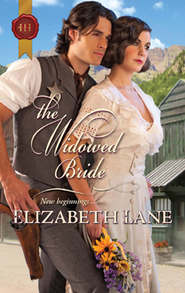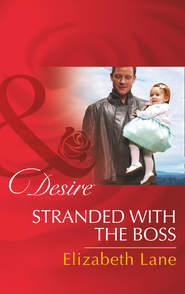По всем вопросам обращайтесь на: info@litportal.ru
(©) 2003-2025.
✖
The Stranger
Настройки чтения
Размер шрифта
Высота строк
Поля
Cradling her son in her arms, Laura carried him through the back door and into the house. Through the window, she caught a glimpse of McCurdy rummaging through the woodpile. Less than an hour ago the man had been a complete stranger. Now he’d be coming into her home. She would be trusting him with her life and the life of her precious son.
The last time she’d opened her door to strangers was the day of her husband’s murder. The thought of doing it again sent a leaden wave of fear through her body. Not all men were evil, she reminded herself. So far, Caleb McCurdy had treated her with courtesy and kindness. But she couldn’t afford to lower her guard. Robbie’s life and her own could depend on her vigilance.
Robbie was whimpering with the pain of his broken arm. Laura laid him on her own bed, propped him with pillows and arranged the arm gently across his chest. She could see where the bone angled halfway between the wrist and elbow. The sight of it made her stomach clench.
Soaking a cloth with cold water from the pump, she laid it over the swelling flesh. Then she brought him some fresh cider to drink out of his special blue china cup. “My brave little man,” she whispered, kissing his damp forehead. “Close your eyes and rest. Everything’s going to be all right.”
She waited until his whimpering eased. Then she found the threadbare flannel nightgown, sat down on the foot of the bed and began tearing the fabric into strips.
Caleb chose a straight chunk of pine and split off two thin slabs with the hatchet. Then he sat down on the chopping block and began smoothing the pieces with his knife, rounding off the rough edges and shaping them to the contour of a child’s arm. Laura’s son would need to wear the splint for at least six weeks. He wanted it to be comfortable.
As he worked, his mind pictured Laura, seeing the terror in her eyes as she plunged toward her fallen child. What if the boy had been killed? Laura was so deeply scarred by the past that one more loss would have shattered her.
And the boy was not out of the woods yet. He could have internal injuries that might not show up right away. Days from now, he could start vomiting blood. Caleb had seen a man die that way in prison after a vicious kick to the gut. The same thing could happen to a child.
Caleb sighed as he shaved the last rough edge off the makeshift splint. How could he ride off and leave Laura alone at a time like this? Unless she ran him off her property with the shotgun, it would be a kindness to stay for a few more days, at least until her son was out of danger. There appeared to be plenty of work to do around the place. He could use that as an excuse, to avoid worrying her.
Brushing the wood shavings off his denims, he sheathed the knife and went around the house to the front door. Laura still viewed him as a stranger. She’d even left his food and gun belt on the porch so he wouldn’t have to come inside. Now he was about to invade her home. One misstep on his part could plunge her into panic. He would have to weigh his every move and measure his every word.
Cautiously he rapped on the door. He heard her light, quick footsteps coming from the back of the house. Then the door swung inward and she stood on the threshold, wide-eyed and trembling.
“Robbie’s resting on my bed,” she said. “I’ll hold him while you set the arm. Will it hurt a lot?”
“I’ll be as gentle as I can. But yes, it’ll hurt. He’ll likely scream, but it’s got to be done.” He followed her through the parlor. Except for the little wooden train cars scattered over the braided rug, the room was much as he remembered it. “If you’ve got some whiskey, we could use it to make him drowsy,” he said.
“No.” She didn’t look back at him. “I don’t keep whiskey in the house.”
She led him into her bedroom, where the boy lay in a nest of pillows. Clearly, Laura was more concerned about her son than she was about having a strange man in this, the most intimate room in her house.
Caleb knew he should keep his eyes on the boy, but he couldn’t help noticing the store-bought mahogany bed with its quilted muslin coverlet and the matching wardrobe and dresser. The wall behind the dresser, where a mirror would have hung, was bare. In fact, there didn’t seem to be any mirrors in the house at all.
A silver-framed photograph of Mark Shafton sat on the nightstand. At the sight of that clean-chiseled face, Caleb’s stomach contracted so violently that for an instant he feared he was going to be sick.
“That’s my papa,” the boy said. “He got killed by some bad men.”
“Lie still, Robbie,” Laura said. “Don’t try to talk.”
“His name was Mark Robert Shafton,” the child persisted. “Like my name, only backwards. My name’s Robert Mark. My mama’s name is Laura. What’s your name?”
“Caleb.”
“My mama says I should call men mister. Can I call you Mr. Caleb?”
“Fine. Now let’s take care of that arm.” Changing the subject, he showed the boy the two pieces of the splint. “Your mother’s going to hold you while I pull your arm and straighten out the bone. Then we’ll put these sticks around your arm and wrap them so it’ll heal straight. All right?”
“You said it would hurt.”
“It will. But only for a few seconds.”
“I won’t cry.”
“It might help if you do.” Caleb glanced at Laura. “Hold him.”
Laura gathered her son close, burying his face against her breast. He squirmed and twisted his head away, wanting to see. She let him, even though she doubted the wisdom of it.
“Brace his shoulder,” Caleb McCurdy said, leaning above them. “Ready?”
Laura gripped the small body, feeling the thin bones strain beneath her fingers. A tear trickled down her cheek. He was so small and so brave. “Ready,” she whispered.
Caleb gripped Robbie’s wrist with one scarred brown hand. The other hand rested on the spot where the boy’s forearm was bent like a badly hammered nail. Gently at first he began to apply pressure, stretching the arm and pushing the break into position. Laura had read that the bones of small children were like green willows, more apt to bend and splinter than to snap. From the look of Robbie’s arm, the bone was still in one piece. Still, the pain had to be excruciating. She bit back her own sobs as her son began to whimper, then to scream.
“Done.” Caleb eased back on the straightened arm. Sweat was streaming down his face. “Good boy, Robbie. You’re as brave as any man I know. Now, if your mother will wrap your arm to cushion it and hand me the splints…”
Robbie’s screams had subsided to jerking sobs. Easing him back onto the pillows, Laura wrapped the first layer of flannel lightly around his arm, then handed Caleb the splints. He held them in place while she wound the wrappings. Working so closely together, it was difficult to avoid contact. The male aromas of sage, wood smoke and fresh perspiration crept into Laura’s senses until she felt strangely warm. Each accidental brush of his fingers against hers sent a jolt of awareness shooting up her arms and prickling through her body. She focused her attention on Robbie, diverting her thoughts from the rough-looking stranger who’d invaded her life. Soon he’d be gone. Then she could get back to the safe, private world she’d created for herself and her son.
He stepped away from the bed as Laura finished the wrapping and knotted the end of the flannel strip. Robbie lay back on the pillows, quiet now.
“Keep the arm raised as much as you can,” Caleb said. “That will ease the swelling.”
Laura rearranged the pillows to support the splinted arm. “I’m going to make you some chamomile tea, Robbie. You can get up later, after you’ve rested awhile.” She glanced back at Caleb, who was moving toward the bedroom door. “I’m beholden to you, Caleb McCurdy. Why don’t you bring your food into the kitchen and eat at the table. I’ll get you some cold cider and a slice of apple pie to go with the sandwich. That’s the least I can do.”
He hesitated for the space of a breath, as if pondering her offer. Then he thanked her and left the room. Laura covered Robbie with the soft merino blanket that had comforted him since babyhood. Bending, she brushed a kiss across his forehead. “Your father would have been so proud of you, my little love,” she murmured. He gave her a teary smile. She kissed him again and hurried out to the kitchen.
Caleb unwrapped his sandwich and laid it on the chipped bone china plate Laura had placed in front of him. He had sat at the same table five years ago. This time he occupied the place at the end, where Mark Shafton had sat on that day of horror.
Caleb was hungry and the food was well prepared. But his dry mouth had lost its ability to taste. Why had he come back here, to this place, these memories and this beautiful, damaged woman? He should have headed west to California or south to Mexico, where he could put the past behind him. Instead he’d chosen to open old wounds, and he was already bleeding.
Laura stood at the stove, measuring dried chamomile into a porcelain pot. He noticed the way she kept the left side of her face turned away from him, hiding the scar. “We don’t get many travelers out here since they finished the railroad,” she said, making polite conversation. “Where are you headed?”
“Texas. San Antone, most likely. Thought I’d take my time and see some new country on the way.” Another lie, as was everything he’d told her except his name. “I don’t see any hired help around,” he said, changing the subject. “How do you manage out here, a woman alone with a youngster? Wouldn’t you be better off selling the place and moving to a town?”
“I might.” She poured boiling water into the teapot. The flowery aroma of chamomile drifted into the room. “But I stay here to keep the land for Robbie. That’s what his father would have wanted—a legacy for him, his children, his grandchildren…” Her voice broke slightly as she spooned some honey out of a jar and dribbled a little of it into the tea. “I sold off the beef cattle and the spare horses after Mark died,” she said. “I wasn’t up to taking care of them, and I needed the money to live on. Steers and mustangs can be replaced. Land can’t. I’ll wear rags and go barefoot before I sell a single acre.”
Struck by the passion in her voice, Caleb studied the proud angle of her head and the determined thrust of her jaw. He had thought of Laura as fragile. But underneath her porcelain doll exterior was a core of tempered steel. He had glimpsed that steel when she’d turned on Zeke, sunk her teeth into his arm and grappled for the knife that would slash her face. Now he was seeing it again.
He should have guessed he would find her here, holding on to what was hers. So why hadn’t he turned around and left as soon as she opened the front door? Why was he still here, risking the chance that he might be recognized?
“But it doesn’t make sense to sit on the land while your money runs out,” he heard himself saying. “A ranch like this one could make you a right handsome living. You could run a herd of cattle, fatten them up on this good grass and ship them east by rail, or sell them to the army. Sheep would do all right in this country, too.”
She toyed briefly with her thin gold wedding ring. “You sound like my husband. He always said that one day we’d have the finest ranch in New Mexico.”
Caleb’s throat constricted around the piece of bread he’d just swallowed. He willed himself not to choke.
“I became a widow six months before Robbie was born,” she said. “I didn’t know the first thing about running a ranch. It was all I could do to survive and take care of my baby. When my nearest neighbor offered to buy the stock, I agreed to his offer, even though I knew he was getting a bargain. I needed the money.”
Caleb took a sip of cold cider and managed to swallow it. If he had any brains he’d get up from the table, thank Laura for the meal and ride away before he dug himself any deeper. But there was the matter of a small, broken boy who might yet need a trip to the nearest doctor. And there was the matter of this scarred, beautiful woman to whom he owed a monstrous debt.
Caleb’s mother had told him that among her people, if someone died because of another’s actions, the bereaved family had the right of adoption. They could claim the offender to take the place of their lost loved one and help provide for their family. It was a wise custom, one that served both justice and practicality.











